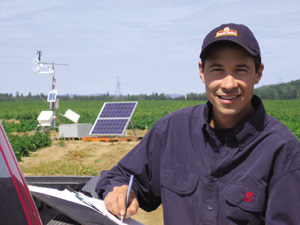
Features
Agronomy
Insect Pests
Crop adviser stresses importance of record keeping
Colony recognizes benefits of good agronomic advice.
November 26, 2007 By Top Crop Manager
The roots of Hutterite Colonies are founded in the European religious turmoil
and reformations of the 1500s. A long history of persecution for their religious
beliefs and a philosophy that stressed separation from the world, resulted in
the colonies developing a somewhat reclusive image. However, in the Canadian
agricultural industry they are increasingly becoming known as friendly neighbours
who are always ready to provide a helping-hand.
 |
| Don Pittman (left) meeting on the premises of the OK Colony with field boss, Joe Hofer (centre) and Ben Hofer during a farm call to discuss some agronomic issues at the start of the winter wheat planting season. |
Hutterites have an obvious attachment to agriculture and a strong love for
the land. While they seek to retain their conservative Christian philosophy
and lifestyle, they have found that in order to survive in farming, they must
keep pace with technological developments that regularly come along in this
industry in order to stay afloat in the modern farm economy. In an age of increasing
taxes and increasingly competitive commodity prices, they have diversified and
modernized their farming operations in order to survive.
Joe Hofer, field boss at OK Colony, points out that farming is a business with
a very small margin for profit and it is no easier for colonies to succeed in
farming than it is for individual farmers. Farming is becoming much more complex
in nature, so growers are finding that they must increasingly reach out for
information from crop advisers and other agricultural experts.
Don Pittman of Pittman Agronomy is located at Warner in southwestern Alberta,
a region where a large number of Hutterite Colonies are concentrated. Pittman
had a long history of providing advice and agronomic support to these colonies
when he worked previously with a number of ag-retail organizations. So when
Pittman decided to establish his own crop consulting business in 2002, it was
natural that he should approach the colonies located near Warner. He was obviously
successful in this goal, since 80 percent of his current crop consulting and
scouting business is associated directly with the colonies. Pittman indicates
that crop scouting is the biggest component of the business. Three associates
are available, as required, to assist with some of the day-to-day scouting.
OK Colony had never previously used the services of a crop consultant, so despite
the fact Pittman had worked with the OK Colony as a retail agronomist, before
they would establish a contract with him, it was first necessary for Pittman
to make a presentation to the Advisory Board. He outlined the agronomic services
he was proposing to offer. This colony had used the services of veterinarians
in their livestock operations, so Pittman set out to demonstrate that his agronomic
expertise focussed on the production of field crops could be just as valuable
to them.
After questioning him about his experience and ethics, the Advisory Board approved
taking on an agronomic advisory relationship with Pittman Agronomy. Ben Hofer,
a key member of the Advisory Committee, indicates a grower has to hire a crop
consultant he can trust. He states that 'two heads are better than one', especially
when it comes to making critical decisions related to herbicide applications
and fertilization. He states that, "In the past, wrong agronomic decisions
have cost us a lot of money."
Joe Hofer concedes he was not comfortable in making all of the important agronomic
decisions on his own, particularly with respect to chemical spraying. Joe indicates
that "We can always count on Don Pittman being in our fields at critical
times" and he will never conduct a spray operation unless first approved
by Pittman. Joe also states, "We are being cost-price squeezed, so we need
to use the best possible agronomic information to survive." He also appreciates
the fact that Pittman's agronomic advice is truly independent and is not tied
to the sale of any product nor segregated from any sales programs.
As a Certified Crop Adviser (CCA), Pittman emphasizes the importance of good
field record keeping as the basis for developing a sound agronomic advisory
service. He found that the field records maintained by growers were less than
satisfactory. So he decided to provide his clients with PDAs (personal digital
assistants), equipped with a field record keeping function that allows them
to easily enter the data out in the field. Once the information is down-loaded
into the office computer, Pittman is able to generate various reports for his
clients. But most importantly, this information is critical for developing sound
agronomic recommendations.
Pittman Agronomy uses a GPS based, benchmark approach to soil testing. "This
approach gives us much more confidence in assessing the year-to-year variations
in soil test nutrient levels," says Pittman. In addition, he provides advice
on effective utilization of manures to maximize the benefits of this important
nutrient source for OK Colony. In addition, guidance is provided on meeting
the requirements of the provincial AOPA Manure Management Guidelines. Pittman
says that technology transfer is a key component of his role as a crop adviser,
particularly as it relates to keeping his clients informed about new varieties
and emerging weed control chemistries.